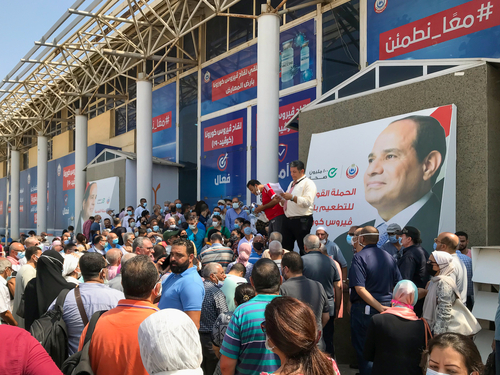Abstract: Amid Egypt’s political unrest, the promise of democracy offers hope for a brighter future. With a government plagued by corruption and suppressing calls for change, a new approach focused on individual rights, transparency, and freedom of speech is urgently needed. The youth-driven revolutionary movements highlight a strong desire for democratic values while aligning with Egypt’s Vision 2030 goals. Embracing liberal principles could empower citizens and position Egypt as a hub for investment, tourism, and growth.
Problem statement: How does cybersecurity play a role in Egypt’s political instability, particularly in relation to government-controlled internet shutdowns, economic struggles, travel restrictions, and religious conflicts affecting the well-being of citizens?
So what?: The Egyptian government’s corruption and oppressive tactics, including cyberattacks and military force, have led to a revolt fueled by widespread dissatisfaction. The people of Egypt are being terrorised and silenced, yet they continue to fight for change. With the rise of revolutionary movements, the voices of the oppressed are being heard. Still, like many nations under authoritarian rule, Egypt’s leaders manipulate power and confuse the public on what they should fight for. After breaking free from authoritarian rule to embrace democracy, Egypt struggles to maintain that freedom. As a nation striving for democratic ideals, Egypt deserves international support, and we should assist in their fight for a more just and free society.

Source: shutterstock.com/Wirestock Creators
Egypt’s Cybersecurity and Politics
In December 2018, the Egyptian government, led by current president Abdel Fattah Al-Sisi, extended their laws on terrorism, media, and cybercrime. However, these new changes of laws have targeted political activists and protestors who are perceived as such threats. The “Arab Spring” protests and revolution are often significant examples of the transformational power of internet politics. Highlighting the organisational and mobilisation potential of social media or “liberation technologies”.[1] Historically, in 2008, opposition groups began leveraging the Internet to organise a movement against former President Hosni Mubarak. Through blogging, tweeting, and using Facebook to coordinate events, they gradually drew the attention of Mubarak himself. By 2009, the Egyptian government had acquired large-scale surveillance technology that enabled extensive access to telephone networks supplied by the company Nokia Siemens Networks. This technological capability allowed for heightened monitoring of digital communications, intensifying the government’s control over dissent and amplifying its influence over public and private digital spaces.[2] In 2011, The Huffington Post reported that, for several years, the Egyptian government had employed deep packet inspection (DPI) monitoring technologies produced by Narus, an Israeli-origin subsidiary of Boeing. This sophisticated technology allowed the government to inspect and monitor data in real time, enabling extensive surveillance of digital communications.[3] The primary legislation the Egyptian government invoked to justify its surveillance activities is the 2003 Telecommunication Law. This law grants state security institutions broad powers, allowing them to monitor and control telecommunications services, resources, and administration whenever “general mobilisation” is declared. The government classified the 2011 revolution as a case of “Mass Mobilisation,” activating these extensive controls. This uprising underscored the powerful role of cyberspace as a new arena for political organisation and an essential tool for democratic activism. It marked the internet as both a platform for policing dissent and a catalyst for political mobilisation, revealing its dual impact on governance and citizen empowerment. Recognising the internet’s potential as a tool for political mobilisation, the Egyptian government took several measures to counteract cyber-activism. Among the most notorious actions was the blocking of Facebook and Twitter at the onset of protests, followed by a five-day nationwide internet shutdown. These drastic steps were aimed at disrupting protestors’ communication and organisation, underscoring the government’s apprehension about the impact of social media and digital networks on political activism.[4] This shutdown was achieved through phone calls from a government agency to all major ISPs instructing them to stop services, potentially authorised under the Telecommunications Law (although the ISP hosting the stock exchange remained online). It reportedly cost the Egyptian economy around $110 million.[5] To circumvent the Internet blackout, Google and Twitter launched a “voice-to-text” software to allow citizens to communicate without the Internet. The software allows online voicemails to be sent out as texts on Twitter using the phrase #Egypt. Following the protests, security agencies targeted and arrested activists who participated in the protests by tracing their phones. To prevent this, protestors started to remove the batteries of their phones in gatherings, while others learned not to even take their phones with them.[6] During this time, the main cybersecurity policy change was the publication of Egypt’s National ICT strategy in 2012. The same strategy was later relaunched under Field Marshal Sisi in 2014 and launched again in 2017.[7] The shutdown does not appear to be a spontaneous event, given that the Telecom and Internet ISPs each shut down its part of Egypt’s Internet in sequence in an average of about three minutes apart, according to Manchester, N.H.-based network security firm Renesys Corp.[8]
Egypt’s Political Crisis
Egypt has long grappled with a political corruption crisis, a legacy of its authoritarian government that persisted until the early 1970s, culminating in the 2011 uprising. During this period, Egyptian citizens successfully compelled the resignation of President Hosni Mubarak (2011), leading to a shift toward a semi-authoritarian government rather than a full authoritarian system that permitted party competition while ensuring that the ruling National Democratic Party maintained its grip on power.[9] By the end of Mubarak’s presidency, the political system appeared stable. However, it faced a significant threat in 2005 when U.S. pressure for democratic reforms led to the Muslim Brotherhood winning 20 per cent of parliamentary seats as independents. This unexpected outcome alarmed the U.S. government, causing it to retreat from pressing Egypt toward democracy. Nevertheless, as Egypt continues to push for democracy, it is still ruled by an authoritarian style government, undermining the revolution.[10] During the 2011 uprising, a diverse coalition of youth, adults, and various groups took to the streets in the capital, demanding Mubarak’s resignation after nearly three decades in power. In response, the Mubarak regime unleashed increasingly violent tactics against the protesters, resulting in hundreds of injuries and fatalities. Mubarak’s attempts to placate dissent ultimately led to his resignation; then President Mohamed Morsi was named the first democratically elected president in over three decades. He promised freedom and justice for the martyrs but eventually repeated the actions of his predecessors and had violent clashes between his opposition and supporters and led to dozens of protestors being killed. Then, in 2014, Field Marshal Sisi was appointed as president and remains current today.[11], [12]
During this period, Egyptian citizens successfully compelled the resignations of presidents Anwar Sadat and Hosni Mubarak, leading to a shift toward a semi-authoritarian government rather than a full authoritarian system.
Corruption within Egypt’s the Government
The Egyptian government has repeatedly abused its power by brutally suppressing citizens, calling for change. Initially, the military, which held control, promised fairness and reform, only to later reverse course, deploying armed forces to attack peaceful protestors. It was later revealed that these actions were influenced by directives from the Muslim Brotherhood’s leadership. The government, tightening its grip on power, resorted to violent crackdowns on dissent while strategically leveraging religion to justify its oppressive actions and silence opposition. As stated by President Sisi “all those taking part on the war will be punished and will not be forgiven”, and the head of the Islamist committee declared that “these revolutionary’s will not be tolerated and be hereby punished by death for our God wills it”, indicating the use of religious rhetoric to legitimise extreme punishments.[13], [14] Additionally, according to Human Rights Watch, security forces attacked the Rab ‘a protest encampment in a hospital on August 14, 2014, without effective warning, using force the military used large amounts of tear gas and left no safe exit for nearly 12 hours, resulting in mass casualties.[15] In 2021, President Sisi proposed a national human rights strategy aimed at strengthening civil, political, economic, and social rights to protect citizens’ rights comprehensively. However, despite this initiative, the government continues to re-arrest individuals previously detained for their involvement in the 2011 revolution. At the same time, reports persist of police and security forces engaging in abuse, torture, and neglect of women’s rights, highlighting ongoing power abuses that undermine the principles outlined in the strategy.[16]
Effects on Economy
Egypt is currently facing an economic crisis that threatens its domestic stability, economic growth, and foreign policy initiatives. Ongoing social unrest and regional conflicts have significantly impacted on the country’s dependence on fuel and food imports, which have become too expensive. As a result, Egypt has turned to short-term foreign financing. Requesting a 12 billion package from the International Monetary Fund (IMF) but was declined, the request was made in response to the Israel-Gaza war and was reduced to 3 billion instead, Egypt then accepted a $3 billion package to be disbursed over the 46 months. However, this funding came with conditions, including the requirement for Egypt to devalue its currency to secure the approval.[17] As noted, “To improve the economy, Egypt has to reduce the government and military footprint in the economy and bring in much-needed foreign investment”.[18] The resulting imbalance has led to currency devaluation and an inflation spike that is hitting the middle and working classes especially hard. The inflation is increasing at a fast rate, from 24.9% in August to 25.8% in September 2024. In Egypt, food prices rose in March 2023 by 61.8% on poultry, pasta, dairy, and red meat, causing the Middle to working class to reportedly have 7 jobs to make ends meet and change their diets to cheaper options. The roots of this crisis trace back years, intensifying since President Sisi assumed power in 2013.[19]
Egypt is currently facing an economic crisis that threatens its domestic stability, economic growth, and foreign policy initiatives.
Between February and March 2022, a combination of rising U.S. Federal Reserve interest rates and the economic impact of the war in Ukraine led to a severe outflow of capital from Egypt, totalling up to $20 billion in debt. This loss triggered a sharp devaluation of the Egyptian pound, worsening the country’s foreign debt crisis and sparking a food shortage due to increased import costs. By the end of the first quarter of 2022, Egypt found itself nearly cut off from international financial markets, further compounding its economic struggles.[20] This exacerbated the country’s already critical foreign debt situation. Egypt, strategically significant to global powers like the United States, often receives loans without fully meeting the usual requirements. For U.S. policymakers, Egypt is seen as vital to regional stability due to its role in maintaining peace with Israel, countering Islamist extremism, and being the largest Arab state. This positions Egypt as “too big to fail” in U.S. foreign policy, as its collapse would pose a severe threat to the region’s stability, security, and diplomatic balance.[21] As a result, the U.S. and the international community continue to support Egypt economically despite mounting human rights abuses under President Abdel Fattah el-Sisi’s brutal regime.
Governmental Misuse of Technology and Cyberattacks
Since March 2019, the Egyptian government has been targeting and monitoring its citizens through a sophisticated spying program that enables it to read emails, log contacts, and track locations.[22] According to reports, attackers have moved beyond traditional phishing methods, employing a stealthy technique known as “OAuth Phishing.” By exploiting third-party applications, they gained access to popular email services like Gmail and Outlook.[23] Additionally, the government has launched phishing pages that impersonate these services, targeting a wide range of Egyptian citizens, including journalists, politicians, activists, and lawyers.[24] Historically, the government has taken extreme measures to suppress protests, such as cutting off the internet during the 2011 uprising, which lasted five days.[25] Currently, the Egyptian government is intensifying its use of phishing, malware, and ransomware attacks against its citizens, with these incidents becoming increasingly frequent and sophisticated. Reports indicate that Cairo has experienced a staggering 49% increase in phishing attacks in 2024 compared to 2023. According to Trend Micro, the company has blocked “56 million threats in Egypt,” with the company’s report revealing a 55% rise in global threat detections and an impressive 242% surge in blocked malicious files.[26]
Effects on Foreign Policy and Travel
Egypt’s domestic unrest has significantly impacted its foreign policy, particularly regarding its roles in Syria, Libya, and the Israel-Hamas conflict, where their stance is a mediator.[27] The European Union is exploring an enhanced role for Egypt in these mediations while weighing the country’s Vision 2030 initiatives against persisting concerns about human rights abuses and political suppression.[28] Egypt’s stringent surveillance and cybersecurity practices further affect its foreign relations, with strict internet controls and government monitoring raising concerns about privacy and freedoms, particularly for political dissidents, activists, and journalists. This combination of political repression and cybersecurity tactics has led to a reputation for suppressive governance that increasingly influences global diplomatic and economic partnerships. The Egyptian government’s extensive cyber-monitoring of citizens and travellers, coupled with regional instability, has led to strict travel advisories by other nations. According to the UK, certain regions in Egypt remain advised against due to potential threats to safety and privacy under government surveillance.[29] These cybersecurity measures often involve monitoring traveller data, tracking digital communications, and enforcing restricted movements. Such practices not only intensify caution from international governments but also reduce Egypt’s attractiveness for tourism and foreign investment, which are vital to its Vision 2030 goals. The continuation of these practices may further limit Egypt’s capacity to encourage tourism, while its surveillance policies restrict both internal travel freedoms for citizens and external access for visitors.
A Brighter Future?
Amid Egypt’s political turmoil, the country remains under the rule of Field Marshal Sisi, whose leadership has largely been reactive and has responded to crises around Egypt’s borders. Sisi proved to be a liability not only to Egypt but also to the broader Middle East. This is especially true in the context of the Israel-Hamas conflict. Given Egypt’s geographical proximity and its historical ties to Muslim leaders, the country could have played a crucial role in preventing the escalation, potentially serving as a mediator or peace broker before Israel began its military actions.[30] The promise of democracy offers hope for a brighter future. With a government entrenched in corruption and resorting to heavy-handed tactics to suppress calls for change, it is evident that a fresh approach is urgently needed. One that envisions individual rights, democracy, and transparency. As Egypt navigates its role in regional conflicts, such as the Israel-Hamas situation, democratic ideals promote freedom of speech and collaboration, perfectly aligning with the goals of “Egypt’s Vision 2030,” a strategic development plan aimed at transforming the country’s economy and improving the quality of life for its citizens. It focuses on sustainable development, economic diversification, and enhancing governance, with an emphasis on transparency, innovation, and social justice.[31] The growing revolutionary movements reflect a powerful desire for democratic values, with Egypt’s youth eager to reclaim their narrative. By embracing liberal principles, Egypt has the potential to build a vibrant political landscape that empowers its citizens and amplifies their voices rather than silencing them. Furthermore, with the international community focused on issues like human rights and stability, Egypt’s commitment to democracy could transform it into a prime destination for investment, tourism, and sustainable growth.
Given Egypt’s geographical proximity and its historical ties to Muslim leaders, the country could have played a crucial role in preventing the escalation, potentially serving as a mediator or peace broker before Israel began its military actions.
Joshua Paul-Mendoza is a Homeland Security Major focusing on Cyber Security & Social Work at Roberts Wesleyan University in the U.S. He has previously volunteered as a firefighter and participated in AFJROTC. Driven by a desire to combat human trafficking and fight against corrupt politics, Joshua aims to contribute to creating a more just and equitable world. This publication marks his debut, and he is currently interning with the Defence Horizon Journal to further his professional journey. The views contained in this article are the authors alone.
[1] Gholam Khiabany, “Technologies of Liberation and/or Otherwise, International Journal of Middle East Studies,” Cambridge University Press, 2015, Technologies of Liberation and/or Otherwise | International Journal of Middle East Studies | Cambridge Core.
[2] Hassib Bassant, “Manipulating uncertainty: cybersecurity politics in Egypt,” Journal of Cybersecurity, Volume 7, issue 1, 2021, https://doi.org/10.1093/cybsec/tyaa026.
[3] Idem.
[4] N. Hassanpour, “Media disruption and revolutionary unrest: evidence from Mubarak’s quasi-experiment,” Polit Commun 2014; 31:1–24, https://doi.org/10.1080/10584609.2012.737439.
[5] L. Greenemeier, “How was Egypt’s internet access shut off?,” Scientific American January 28, 2011, https://www.scientificamerican.com/article/egypt-internet-mubarak/.
[6] Idem.
[7] MCIT (Egypt), “Publications – Egypt’s ICT Strategy 2014 -2017,” Ministry of Communications and Information Technology, 2014, https://mcit.gov.eg/en/Publication/Publication_Summary/10500.
[8] Hassib Bassant, “Manipulating uncertainty: cybersecurity politics in Egypt,” Journal of Cybersecurity, Volume 7, issue 1, 2021, https://doi.org/10.1093/cybsec/tyaa026.
[9] Marina Ottaway, “Authoritarian Governance in Egypt: A Return to the Past 2020,” ISPI90, September 15, 2020, https://www.ispionline.it/en/publication/authoritarian-governance-egypt-return-past-27405.
[10] Idem.
[11] Britannica, T. Editors of Encyclopedia, “Egypt Uprising of 2011,” Encyclopedia Britannica, January 18, 2024, https://www.britannica.com/event/Egypt-Uprising-of-2011.
[12] Idem.
[13] Real Stories, @RealStories, “The Square: Egypt at War (Oscar-Nominated Documentary),” October 17, 2020, https://www.youtube.com/watch?v=2a6SLuVtiVU.
[14] Idem.
[15] Idem.
[16] HRV(Egypt), “Egypt: Rab ‘a Killings Likely Crimes Against Humanity,” HUMAN RIGHTS WATCH, August 12, 2024, https://www.hrw.org/news/2014/08/12/egypt-raba-killings-likely-crimes-against-humanity.
[17] Idem.
[18] ICG(Egypt), “Egypt in the Balance?,” International Crisis Group, May 31, 2023, https://www.crisisgroup.org/middle-east-north-africa/north-africa/egypt/eygpt-in-the-balance.
[19] Nathan McQuarrie, ”IMF Bailouts Won’t Fix Egypt’s State Controlled Economy,” JOURNAL OF PUBLIC & INTERNATIONAL AFFAIRS, December 11, 2023, https://jpia.princeton.edu/news/imf-bailouts-won%E2%80%99t-fix-egypt%E2%80%99s-state-controlled-economy.
[20] Amr Adly, “How the IMF became part of Egypt’s problem,” Bretton Woods Project, 2023, https://www.brettonwoodsproject.org/wp-content/uploads/2023/10/Egypt-and-the-IMF.pdf.
[21] Nathan McQuarrie, ”IMF Bailouts Won’t Fix Egypt’s State Controlled Economy,” JOURNAL OF PUBLIC & INTERNATIONAL AFFAIRS, December 11, 2023, https://jpia.princeton.edu/news/imf-bailouts-won%E2%80%99t-fix-egypt%E2%80%99s-state-controlled-economy.
[22] CPR, “THE EYE OF THE NILE,” CHECK POINT RESEARCH, October 03, 2019, https://research.checkpoint.com/2019/the-eye-on-the-nile/.
[23] Idem.
[24] ALJAZEERA, “Arab Spring anniversary: When Egypt Cut the internet,” January 25, 2016, https://www.aljazeera.com/features/2016/1/25/arab-spring-anniversary-when-egypt-cut-the-internet.
[25] Ludo Fourrage, “Cybersecurity Threats in Cairo, Egypt: What You Need to Know,” Nucamp, April 09, 2024, https://www.nucamp.co/blog/coding-bootcamp-egypt-iegy-cybersecurity-threats-in-cairo-egypt-what-you-need-to-know.
[26] Basel Khaled, “Trend Micro blocks over 56 million threats in Egypt, Reveals Annual Cybersecurity Report,” Trend Micro, May 10, 2023, https://alamrakamy.com/article/49865.
[27] EU, “Egypt’s Foreign policy within a challenging regional context,” European Parliament, (2021), https://www.europarl.europa.eu/RegData/etudes/BRIE/2021/698062/EPRS_BRI(2021)698062_EN.pdf.
[28] Idem.
[29] GOV.UK, “Foreign travel advice,” September 23, 2024, https://www.gov.uk/foreign-travel-advice/egypt.
[30] Alexander Clarkson, “Egypt’s Weakness Under Sisi is a liability for the Middle East,” WORLD POLITICS REVIEW, January 17, 2024, Sisi’s Egypt Is a Passive Bystander Amid the War in Gaza | WPR (worldpoliticsreview.com).
[31] MPED, EGYPT VISION 2030 LAUNCH, MINISTRY OF PLANNING AND ECONOMIC DEVELOPMENT, 2024, mped.gov.eg/Highlights?id=1&lang=en&Egypt-Vision-2030-Launch.





